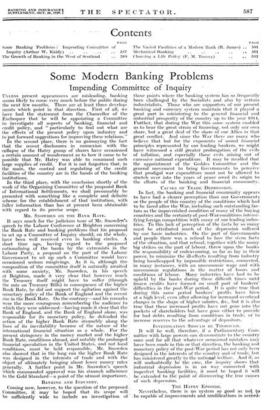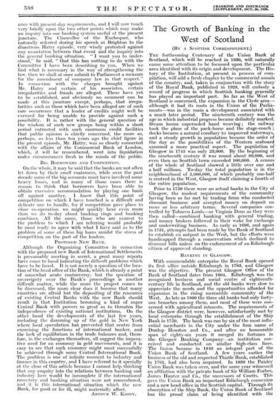Some Modern Banking Problems
Impending Committee of. Inquiry
UNLESS present appearances are misleading, banking seems likely to come very much before the public during the nextfew months. There are at least three develop- ments which -point in that direction. First of all, we have had the -statement from the Chancellor of the• Exchequer that he will be appointing a Committee . to investigate all aspects of banking, financial . and credit policy, and "particularly to find out what are the effects of the present policy upon industry and to -put forward suggestions for improving these relations." In the second place, there is no gainsaying the fact that the recent disclosures in connexion with the collapse of the Hatry group of shares have occasioned a. certain amount of wonderment as to how it came to be possible that Mr. Ilatry- was able to command 'such large supplies of credit. For it is not forgotten that, in the main, the control and regulating of the credit facilities of the country are in the hands of the banking: institutions.
In the-third place, with the conclusion shortly of the work of the -Organizing Committee of the 'proposed Bank of International- Settlements, we shall -presumably be presented with something like a complete and definite scheme: for the establishment of that institution, with fuller information than has at present been obtainable with regard to its precise scope.
Mn. . SNOWDEN ON THE BANK RATE.
It says much for the judicious tone of Mr. Snowden's speech to the Labour Conference at Brighton concerning the Bank Rate and banking problems that his proposal to set up a Committee Of. Inquiry should; on the whole, have been well received even in banking circles. A short time ago, having 'regard to the proposed nationalizing of the banks by the extremists in the Labour Party, a proposal on the part of the Labour Government to set up such a Committee would have occasioned serious misgivings. As it is, although the composition of the committee itself is naturally awaited with - some anxiety, Mr. Snowden, in his speech at Brighton, made it very clear that however much the Treasury itself might have to suffer (through the rate on Treasury Bills) in consequence of the higher Bank Rate, he did not support the agitation against the monetary policy of the Bank of England and the recent rise in the Bank Rate. On the contrary—and his remarks were the more courageous remembering the audience to which they were addressed—having made it clear that the • Bank of England, and the Bank of England alone, was responsible for its monetary policy; he defended the action of the higher Bank Rate staunchly along the lines of its inevitability because of the nature of the - international financial situation as a whole. For the present stringency in the money market and the higher Bank Rate, conditions abroad, and notably the prolonged ' financial speculation in the United States, and not local conditions, must be held responsible. Mr. Snowden also showed that in the long run the higher Bank Rate': was designed in the interests of trade and with the. object of ultimately bringing • about lower money rates ' generally. A further point in Mr. Snowden's speech: which commanded approval was his staunch adherence to the Gold Standard—a point of the utmost importance.
BANKING AND INDUSTRY.
Coming now, however, to the question of the proposed ; Committee, it may be hoped that its scope will: be sufficiently wide to include an investigation. of. those points where the banking system: has so frequently been challenged by the Socialists and also by certain industrialists. Those who are supporters of our present banking and currency system maintain that it played a great part in ministering, to the general financial and industrial prosperity of the country up to the year 1914. Further, that during the War this same system enabled us to bear the great strain of financing, not only our own share, but a great deal of the share of our Allies in that great conflict. And since the War there are many who believe that but for the exponents of sound financial principles represented by our leading hankers, we might have witnessed a. still greater prolongation of the evils of inflation, and especially those eyds arising out of excessive national expenditure. It may be recalled that the appointment of the Geddes Committee and the general movement to bring Governments to perceive that prodigal war expenditure must not be allowed to stretch over into the years of peace owed its origin to the efforts of the banking and financial community.
CAUSES OF TRADE DEPRESSION.
In fact, the banking and financial community appears to have had a clearer. perception than our Governments or the people of this country of the conditions which had to be faced after the War, including such outstanding fac- tors as the impoverished condition of Many of the buying countries and the certainty of post-War conditions intensi- fyingforeign competition with many,of our leading indus- tries. To this lack of perception of the facts by so niany must be attributed much of the depression suffered by our basic industries. On the part of Governments and people there was a refusal to face the stern facts of the situation, and that refusal, together with the many big strikes_ on the 'part Of labotir, threw upon the banks the responsibility of endeavouring, so far as lay in their power, to minimize the illeffects :resulting from industry being handicapped by impossible' restrictions, connected; in many instances, with an uneconomic wage and with uneconomic regulations in the matter of hours and conditions of labour. Many .industries have had to be upheld by the banks during these difficult times until frozen credits haVe formed no small part• of bankers' difficulties in the post-War period. It is quite true that during this same period bankers' profits have been at a high level, even after allowing for increased overhead charges in the shape of higher salaries, &c., but it is also true that these increased profits have not gone into the pockets of shareholders but have gone either to provide for bad debts resulting from conditions in trade, or to increase reserves to the advantage of depositors.
INVESTIGATION SHOULD BE THOROUGH.
It will be well, therefore, if a Parliamentary Com- mittee with large powers can demonstrate to the country once and for all that whatever occasional mistakes May have been made in this or that direction, the banking and monetary policy of the post-War-period has not only been designed in the interests of the country and Of trade, but has ministered greatly to the national welfare. And it; as will undoubtedly be the case, the inquiry shows that industrial depression is in no way connected with imperfect banking . facilities, it- be hoped it Will be extended to the point of discovering the true causes of such depression. . . .
Th HATRY El■ISODE.
Nevertheless, there is no system so good as not to -.be capable of improvements and modifications in accOrd- ance with present-day requirements, and I will now touch very briefly upon the two other points which may make an inquiry into our banking system useful at the present juncture. The Chancellor of the Exchequer, who naturally referred during his speech at Brighton to the disastrous Hatry episode, very wisely protested against any association between that event and the inquiry into the general banking situation. "I want you to under- stand," he said, "that this has nothing to do with the Committee I have been describing to you. When we find what is necessary, in the way of strengthening the law, then we shall at once submit to Parliament a measure for the amendment of company law in that respect." In connexion with the charges brought against Mr. Hatry and certain of his associates, certain irregularities and frauds are alleged. These have yet to be established, and obviously no comment can be made at this juncture except, perhaps, that irregu- larities such as those which have been alleged are of such rare occurrence that a lender of credits might well be excused for being unable to provide against such a possibility. It is rather with the general question of the wisdom of such new groups being within a .short period entrusted with such enormous credit facilities that public opinion is chiefly concerned, the more so, perhaps, as less than ten years ago the chief figure in the present episode, Mr. Hatry, was so closely connected with the affairs of the Commercial Bank of London, which, it will be remembered, went into liquidation under circumstances fresh in the minds of the public.
BIG BORROWERS AND COMPETITION.
On the whole, it may be said that the banks are not often let down by their small customers, while over the past decade some Of the big accounts must have involved some heavy losses, and in many of those cases there is reason to think that borrowers have been able to obtain excessive accommodation by playing one bank off against another. I know that this point of competition on which I have touched is a difficult and delicate one to handle, for if competition gave place to Close co-operation we might quickly hear even more than we do to-day about banking rings and banking cOmbines. All the same, those who are nearest to the problem to which I am referring would probably be most ready to agree with what I have said as to the problem of some of these big loans amidst the stress of competition on the part of the lenders.
PROPOSED NEW BANK.
. Although the Organizing Committee in connexion with the proposed new Bank of International Settlements is presumably meeting in secret, a great many reports have come to hand indicating the difficult problems which have to be faced. It is not merely a question of the loca- tion of the head office of the Bank, which is already a point of somewhat acute controversy, but the question of ' sovereignty over the Bank's proceedings is another difficult matter, while the more the project comes to be discussed, the more clear does it become that many countries are afraid lest the depositing of the resources of existing Central Banks with the new Bank should result in that Institution becoming a kind of super Central Bank with powers so great as to threaten the independence of existing national institutions. On the other hand the developments of the last few years, including the damming up of the gold in New York - where local speculation has prevented that centre from exercising the functions of international banker, and the lack of equilibrium in the trade balances and, there- fore, in the exchanges themselves, all suggest the impera- ' tive need for an economy in gold movements, and it is easy to see that such economy might Most successfully be achieved through some Central International Bank. The problem is one of infinite moment to industry and finance in this country, and I have referred to it specially at the close of this article because I cannot help thinking that any enquiry into the relations between banking and industry here would be incomplete if the international monetary and banking situation were not remembered, and it is this international situation which the new Bank, for good Or for ill, might materially affect.
- Manua W. KIDDY;



















































 Previous page
Previous page